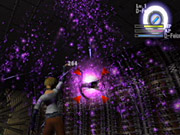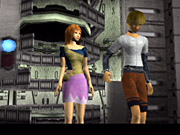Galerians: Ash is the sequel to the PlayStation game Galerians, a twisted tale of sentient computers run amok and genetically-enhanced mental patients with psychic powers. Ash picks up where the first game left off, which is obviously a good thing if you're a fan of its survival-horror-ish gameplay and dark setting. If you're not, though (and unless your tastes fall into a pretty specific niche, you probably aren't), Galerians: Ash won't do a whole lot to reel you in. The game features a fairly decent concept, but as is too often the case, the execution is so flawed that only the most tenacious gamers will want to stick with it.

In the original Galerians, the supercomputer Dorothy took control of the city that it once served, and in order to eradicate the human populace, Dorothy genetically engineered a race of psychic humanoids called galerians. Dorothy and her galerians were finally defeated by an amnesiac mental patient named Rion who had control of an assortment of psychic attack powers. At the end of the game, though, Rion discovered that he too was a galerian implanted with the memories of the real, deceased Rion. As Dorothy died, so did Rion. Galerians: Ash takes place six years later, when Dorothy's final children, the last galerians, are wreaking havoc upon the battered human survivors. The backup data of Rion's mind has been restored into his cryogenically preserved body, and he must defeat the last galerians and their walking nuclear reactor of a leader, Ash.
In gameplay terms, Galerians: Ash is hard to categorize. It has the disturbing imagery and item fetching of a survival horror title and the character interaction and stat upgrades of an RPG. The combat, with its variety of ranged attacks and lock-on capability, is somewhere between Resident Evil and the recent Legend of Zelda games. Perhaps the game is stretched too thinly across multiple genres, because it doesn't really succeed at doing any of them well. If the designers had spent less effort on the generally thin and uninteresting dialogue, for instance, and more on reducing the tedium of running back and forth, looking for the next gameplay trigger or item, Galerians: Ash would have been a more coherent and fun experience.

The core of Galerians: Ash involves controlling Rion as he joins up with the human survivors and fights the last galerians and their minions. As mentioned, Rion can lock on to enemies and circle around them Zelda-style, and he has five psychic attacks to wield against them. These range from a simple telekinetic force wave to an antigravity lift to homing energy beams. Enemies' hit points are displayed RPG-style as you fight them, and when they die they sometimes give up items that can heal you or boost your own hit point or weapon maximums. Rion has a separate meter for each of the five attacks, and when he's low he effectively has to shoot up with the appropriate serum to replenish his attack power. Every time he uses his powers or sustains damage, Rion's "addiction" meter goes up, and when it reaches the limit, his brain literally shorts out. While shorted, he's impervious to enemy attacks, but he can only move at a crawl and his HP drains quickly and consistently. To counteract a short, you'll need to administer another item that's dropped by enemies, the delmetor. The game is often very bad about distributing items evenly, and sometimes you'll be stuck without a healing item or a delmetor when you desperately need one. A little more attention paid to making sure you get the right item more often would have made the combat a lot less frustrating.
Galerians: Ash is not only a surprisingly difficult game, but it's also a fairly boring one. You'll spend too much time running around bland environments, trying to figure out who you need to talk with next to advance the story or trigger the next enemy encounter. The dialogue is often generic and the tasks are often banal, making the game a lot less interesting than it could have been. Ash's premise may be fairly imaginative, but the plot doesn't hold any real surprises, and it provides little incentive to press onward through the mire of the gameplay. It's a shame--the game features some pretty good ideas, but they aren't quite brought to fruition. With a little more polish, Galerians: Ash could have been something special, but as it stands, it doesn't really live up to its potential.